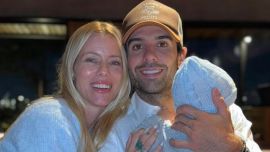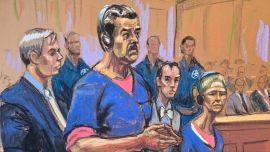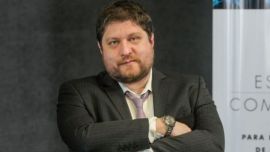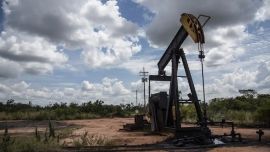The nation's top appeals court on Tuesday dismissed the so-called ‘dollar futures’ fraud case against Vice-President Cristina Fernández de Kirchner and a host of former officials from her 2007-2015 government.
In a unanimous ruling issued by the Federal Criminal Cassation Court, a three-judge panel ruled that the case lacked evidence and that no crime had been committed. It shelved the file, saying it was unnecessary to send it to trial.
Fernández de Kirchner, 68, and several ex-government officials were accused in October 2015, when she served as Argentina’s president, of fraud in relation to futures contracts for the purchase of dollars.
Buenos Aires Province Governor Axel Kicillof, who served as Fernández de Kirchner’s economy minister, and the ex-governor of the Central Bank, Alejandro Vanolli, as well as his then-deputy, Miguel Ángel Pesce, the institution’s current chief, are among 11 other defendants in the case.
The investigation is one of eight fraud and corruption cases facing Fernández de Kirchner related to her two terms in office. However, it was seen by many court analysts as one of the weakest and its dismissal was not a shock.
Allegations
The case against the former president alleged that ahead of the 2015 election, dollars in the futures contracts were sold below market value, a highly lucrative asset for the buyer. It was filed by two opposition leaders, Cambiemos lawmakers Mario Negri and Federico Pinedo, on October 30, 2015, just five days after the first round of the 2015 presidential elections.
Fernández de Kirchner, who was accused of “fraudulent administration to the detriment of the State,” could not stand in the election as she had already served two consecutive terms. She endorsed fellow Peronist Daniel Scioli, who subsequently lost to the opposition leader Mauricio Macri in a run-off, leading to an uncomfortable handover.
Before the 2015 election, the Central Bank agreed to foreign currency sales at stable rates in a bid to discourage devaluation of the currency during a period of currency controls.
But when Macri lifted those controls after he was elected, the peso plunged by 30 percent, resulting in a loss of 55 billion pesos (around US$5.5 billion at the time) for the Central Bank.
The court said that an analysis conducted by Supreme Court accounting experts in 2020 found that there were no irregularities nor detriment to the Central Bank.
The judges’ ruling, running to more than 100 pages, said it would dismiss the accused as the report “overthrew the accusation.” It acknowledged that there were irregularities in the case that, had they been corrected earlier, would have led to an earlier dismissal.
“The facts under investigation do not fit into a legal figure," so it "corresponds to rule the dismissal of the accused,” read the ruling, signed by Judges Daniel Petrone, Ana María Figueroa and Diego Barroetaveña.
In addition “the extension of the accusation to the then-President and her Minister of Economy is not understood, as a result unjustified and not in accordance with the law,” it added, arguing that “due to the powers inherent in their positions, they are completely unrelated to the tasks carried out by” the Central Bank, the judges added.
The ruling means the case will now remain inactive, unless someone challenges it before the Supreme Court.
‘Persecution’
The now-shelved case is one of eight facing Fernández de Kirchner related to her two presidential terms. The former president denies all the allegations against her and claims she is the victim of “judicial and political persecution.”
Appearing in court by video link last month, she told the judges the case was politically motivated and designed to influence the 2015 election. The former president vehemently attacked the Judiciary, naming a number of legal figures who had raised cases against her, including late federal judge Claudio Bonadio, who led several investigations.
"This is not only a leading case of lawfare but also the meddling and manipulation of judicial power in the electoral processes and Argentine politics," said the Frente de Todos leader in a fiery speech streamed live on the Internet.
Lawfare is a form of political manipulation that uses legal means to discredit or harm someone for political purposes.
Fernández de Kirchner, who faced between two and six years in prison if found guilty, argued that the case was ridiculous, saying such operations were regulated and did not cause damage to the Central Bank.
The ex-president also charged that the profiteers from the dollar futures were in fact the friends and officials of Macri since they had inside information on the devaluation they were planning.
"There was no friend of the outgoing government among those who bought a dollar futures [contract]. No, no, no. There were all the friends of he who was already president, Mauricio Macri, moreover, there were government officials,” charged the former president.
"They came into government, they devalued [the currency], they took advantage of the devaluation and those of us who are sitting here accused are us," she added. “You, the Judiciary, are responsible for what has happened."
The case’s dismissal comes at a complicated time for the Judiciary, which has been strongly criticised by Fernández de Kirchner and President Alberto Fernández, who assumed office in December 2019 after defeating Macri, returning Peronism to power with the Frente de Todos coalition.
Fernández has denounced lawfare repeatedly and vowed a sweeping reform of Argentina’s court system. Initial legislative efforts to overhaul the Judiciary were stalled by the arrival of the coronavirus pandemic, although the Peronist leader promised to follow through with reform in his state-of-the-nation speech opening Congress a few months ago.
– TIMES/PERFIL with agencies.

























Comments